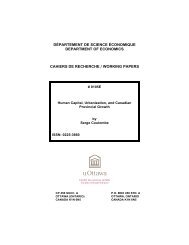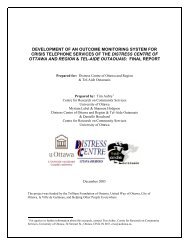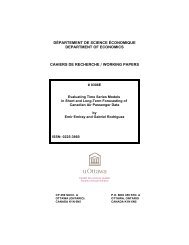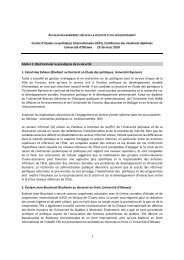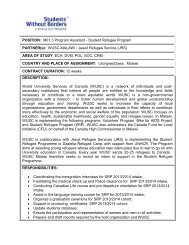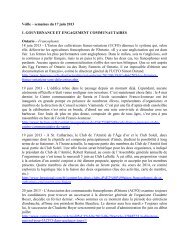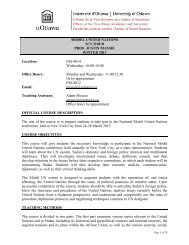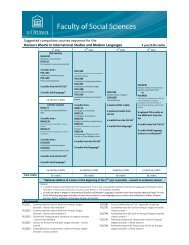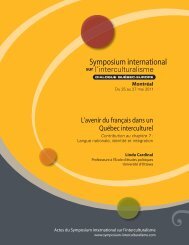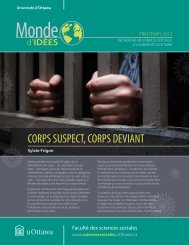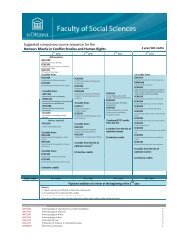Full text - Faculty of Social Sciences - Université d'Ottawa
Full text - Faculty of Social Sciences - Université d'Ottawa
Full text - Faculty of Social Sciences - Université d'Ottawa
You also want an ePaper? Increase the reach of your titles
YUMPU automatically turns print PDFs into web optimized ePapers that Google loves.
168 IPC Review 3 Strategy to Engage Regional Government in the Prevention <strong>of</strong> Violence Against Women 169<br />
Women in Cities International<br />
As in many Western countries, ground level work on women’s safety and<br />
equity in Canada and in Peel Region specifically is <strong>of</strong>ten carried out in<br />
isolation and with much energy expanded on organizational survival and<br />
meeting the immediate service needs <strong>of</strong> women and their children. Often,<br />
knowledge exchange and involvement in broader global advocacy is not within<br />
our practical reach or part <strong>of</strong> the focus <strong>of</strong> funding priorities. Our introduction<br />
to Women in Cites International (WICI) would <strong>of</strong>fer us the opportunity to<br />
position ourselves on the international stage and enable us to examine the<br />
work in Peel in relation to similar work that was happening globally.<br />
In 2006, Women in Cities International, funded by Status <strong>of</strong> Women Canada,<br />
circulated a call for proposals for a project entitled “Building Partnerships<br />
for Local Action on Women’s Safety.” WICI is an international network <strong>of</strong><br />
partners concerned with gender equity issues and the place <strong>of</strong> women in cities.<br />
It seeks to disseminate information on issues related to gender equality, the role<br />
<strong>of</strong> women in cities, and the application <strong>of</strong> a gender approach in community<br />
and municipal decision-making and public policy processes. This network acts<br />
as a consultant to local, national, and international governments in promoting<br />
policies and programs that take gender into account, foster the greater<br />
participation <strong>of</strong> women, and increase the effectiveness <strong>of</strong> actions undertaken<br />
by women’s organizations at the community level. The Building Partnerships<br />
for Local Action on Women’s Safety project aimed to facilitate the involvement<br />
<strong>of</strong> women’s organizations in the public policy process and increase sustainable<br />
working relationships between public bodies and communities by developing<br />
and implementing a new partnership model in six pilot communities in Canada.<br />
Peel was accepted as one <strong>of</strong> the six pilot sites (along with Williams Lake, BC;<br />
Regina, SK; Bellechasse, QC; Kuujjuaq, NU; and Charlottetown, PEI) and<br />
began a multi-year initiative with WICI to learn to partner effectively with<br />
our Municipal government and raise awareness <strong>of</strong> gender mainstreaming and<br />
ultimately facilitate its implementation. The conclusion <strong>of</strong> the second year <strong>of</strong><br />
this project involved Peel region’s participation in the UN-Habitat Conference,<br />
the World Urban Forum III (WUF3).<br />
Since the mid 1970s, the United Nations has been experiencing a ground<br />
swell <strong>of</strong> women-led advocacy around issues <strong>of</strong> women’s safety and political<br />
participation. At that time, the United Nations supported the UN Environmental<br />
Program (UNEP), which struggled to differentiate the complex intersection<br />
<strong>of</strong> environmental and habitat issues (Lee-Smith, 2006). The result was the<br />
formation <strong>of</strong> the United Nations Centre for Human Settlements (UNCHS),<br />
which, in 2002 became United Nations Habitat (UN-Habitat), a full fledged<br />
program <strong>of</strong> the United Nations (Lee-Smith, 2006). The tireless advocacy <strong>of</strong><br />
many feminists and their allies to highlight women’s unique experience <strong>of</strong><br />
their environment and habitat fostered a growing consciousness <strong>of</strong> the rights <strong>of</strong><br />
women to own, control and inherit property, as well as their role in governance<br />
and community development, including safety. The World Urban Forum III<br />
took place in Vancouver, British Columbia, Canada in June 2006 and was the<br />
meeting ground for the Women in Cities International pilot site directors, as<br />
well as thousands <strong>of</strong> women’s organizations from around the world.<br />
The WUF3 was dedicated to examining rapid urbanization in a world where<br />
half <strong>of</strong> humanity lives in cities and where, over the next 50 years, that proportion<br />
is expected to reach two-thirds <strong>of</strong> the global population. Most <strong>of</strong> this urban<br />
growth is taking place in developing countries, but wealthier nations are also<br />
experiencing problems <strong>of</strong> rapid urbanization such as crumbling infrastructure,<br />
smog, and social exclusion. The Region <strong>of</strong> Peel’s Commissioner <strong>of</strong> Health<br />
and both collaborative directors traveled to Vancouver for the WUF3. The<br />
Forum brought together experts from around the world representing all<br />
levels <strong>of</strong> government, local authorities, intergovernmental organizations, nongovernmental<br />
organizations, international organizations, community groups,<br />
urban and business pr<strong>of</strong>essionals, academics, students, and national and<br />
international associations. For five days, thousands <strong>of</strong> participants from more<br />
than 150 nations discussed, debated and shared experiences about how to make<br />
our cities better places to live. Canada’s participation featured Peel Region,<br />
along with the other five Canadian pilot sites, as models <strong>of</strong> communities<br />
working effectively with their municipal government. The experience provided<br />
the collaboratives with strategies to continue to broaden their influence with<br />
the Region. Participation in this event provided PCAWA and PCSA with<br />
a stronger rationale and an evidence-based foundation on which to begin<br />
changing the unidirectional nature <strong>of</strong> their relationship with the Region and<br />
introduced both the collaboratives and the Region <strong>of</strong> Peel to the fundamental<br />
principles <strong>of</strong> gender mainstreaming in local governance.<br />
Gender Mainstreaming in Peel Region<br />
Upon returning from the World Urban Forum in June 2006, PCAWA,<br />
PCSA and the regional Commissioner <strong>of</strong> Health developed new strategies as<br />
to how to influence discussions about gender mainstreaming at the regional<br />
level. Coincidentally, the Region was in the midst <strong>of</strong> developing a three-year<br />
Regional Strategic Plan (2007-2010), for which it was soliciting stakeholder<br />
input. Both collaboratives participated in the stakeholder sessions to attempt



